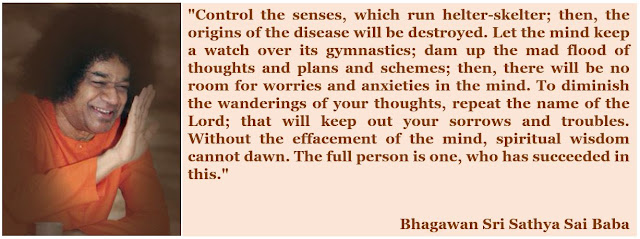Chapter VI
Meditation Reveals the
Eternal and the Non Eternal
“The seen is transitory;
this is seen through meditation. When people wander helter-skelter in a strange
land, not knowing the road, and when someone comes to direct them along the
right path, it is not right to laugh at and dishonour them — it brings about
only ruin and confusion!
But today, it has become
the habit of people to curdle the love (prema),
these embodiments of love, into poison through ignorance of the role of
helpfulness that these guides have come to play.”
Introspection
What to talk about
sages, masters and holy men who devote their life for transforming / guiding
their fellow being(s), Even an Avatar is not recognized, even an avatar’s
guidance is not taken seriously, even by those who believe that He is God
Incarnate
Swami continues,
"Note this! Love
and destruction arise from the same native spot. The same sea that yielded
gems, the moon, nectar, and the goddess of wealth also brought forth the
world-destroying halahala poison.
Under these conditions,
one must, like Sri Narayana, accept the good and the auspicious; otherwise, one
cannot have nectar and Lakshmi. The heroic and the adventurous, like Siva, can
have the poison as their need."
The Lord’s grace is needed to cross the sea
This sea of life (samsara), turbulent with the waves of joy and misery,
can be crossed only by those who have an unflinching desire for the essence of
bliss; the rest will be submerged.
The capacity to overcome
the qualities (gunas) of nature
(prakriti) is not inherent in everyone; it comes to one
with the grace of the Lord. And that grace is to be won by repetition of the
divine name and meditation. This must first be clearly understood: it is
impossible for everyone to control the tendencies of nature; the power is
possessed only by those who have nature in their grip and whose commands nature
obeys.
Nature (prakriti) is the basis of everything in the universe. It
is the basis of creation and existence. All this is nature: men and women,
beasts and birds, trees and plants. In fact, all that can be seen is
inseparable from nature. In this endless creation, the active element is the
Lord (Purusha).
Introspection
Purushartha and Divine
grace has been covered elaborately in Karma session / Blog posts under Karma
theme.
There can be a contradiction
/ confusion after reading Swami’s writing above on Grace.
An intelligent being
(who has not undertaken intense purushartha as yet) may think that the whole
thing is confusing. On the one hand, it is said that the ultimate emancipation
is not possible without divine grace and on the other hand, it is also said
that divine grace is possible only with sincere efforts. So, Grace first or
efforts first? If efforts would surely be undertaken, then what can stop God
from bestowing His grace?? And why any grace is required at all if efforts is
complete??
Most convincing
answer for this is,
“Undertake Purushartha
to your fullest capacity”
If all Artha and Kama
are subjected to, screened through Dharma, with Moksha as the only aim all
through, then such a ripened Sadhaka would never ever think / wait / hope to
get Lord’s grace as a give and take policy. His Dharma is to pursue goal of
Self-Realization. Only when such a life is led, Yes, God cannot wait / hold
back to bestow His grace on the sadhaka!
So, if one does not get
Lord’s grace at his penultimate step in the path of Self-Realization, one
has to introspect whether his purushartha is really complete and selfless
or not.
When you gain a deeper
insight into Grace you naturally start putting forth effort in your life; you
don’t just sit around brooding over a task that confronts you. You remark with
a smile, “Even if it appears momentous I will do my best—and God within me will
do the rest.” With this kind of attitude you will find your life filled with
success. But when you stop your effort, relying entirely on Divine Grace, you
have misunderstood.
God’s Grace operates
through your intellect, through your mind, through your personality. Whenever
you are exerting your effort in life, it is Divine Grace that is guiding your
actions in that direction. As you do your best, it is God within who prompts
you.
To the extent that you
recognize God within yourself by subduing your ego, to that extent Grace flows,
expressing itself in these four aspects.
Thus, to receive Grace,
sadhana is important. Self-effort must never stop. Rather it must be done with
a cheerful disposition, with the philosophical understanding that God will not
put you into a task unless he has given you the strength to perform it. He will
never place you in a situation for which you do not have endurance. No matter
how adverse the situation may appear, there is a meaning behind it.
If you have this
understanding you strive with faith in your heart and tenacity in your effort.
Faith is the secret of spiritual advancement as well as of worldly prosperity.
But when faith is lacking, life is empty.
So, with faith and
effort, one begins to experience the Divine Grace that purifies one’s ego,
promotes sattwa (purity of nature), and removes the subtle impurities of the
mind. There is no effort on an individual’s part that can remove the subtle
roots of egoism, hatred, greed and pride.
You may be highly
rational and reflective, but it is only when you recognize the Divine Power
within you and bow down to that power with love and devotion that Divine Grace
will clear your path in a mysterious way.
Love.



